I’m going to babble in a non-review capacity for a moment. Feel free to ignore this post if this isn’t what you’re here for.
New NES Games
Just the other day I was lamenting to my old pal The Admiral regarding my apparent inability to keep up with this blog. He patted me on the shoulder in a manner at once condescending and sympathetic and said, “Don’t worry, you’ll catch up – it’s not like they’re making any new games for the NES.” While I appreciate the sentiment, and I certainly don’t think that it’s an altogether unfair statement, what about…
BreakThru
Publisher: Data East
Year: 1987
Genre: Shmup Side-Scroll
In BreakThru, you are the driver of a jumpy car (a fairly common video game theme even today) who must drive into enemy territory, assault their base and recover a top secret jet of some sort (top-secret jets are also a fairly common theme).
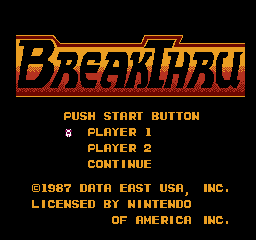
Along the way, you’ll battle enemies that shoot constantly into the area you have to occupy to even have a chance to shoot them, parachutes that prevent their precious cargo from ever reaching all the way to the ground, and chunky controls that will kill you more effectively than any of the enemies can hope to.
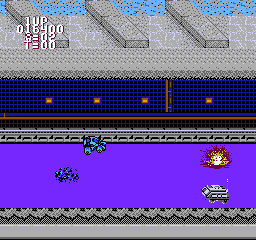
John’s Rating: 2.0 out of 5.0. There’s not too much mechanically wrong with this game, it’s just hard to pinpoint anything this game did right. The graphics are lackluster, the gameplay is bland and unsatisfying, the enemies are dull yet difficult, and although the sound is not overly annoying the best that can be said of it is that it is forgettable.
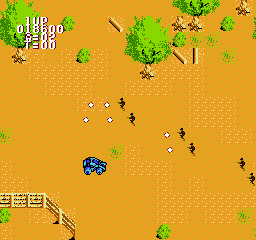
Bomberman
Publisher: Hudson Soft
Year: 1987
Genre: Action
Bomberman is a game about a little robot guy who, presumably, lives in a dytopian future where sentient robots are relegated to menial production jobs and all structures are comprised of a combination of bricks and blast doors. Bomberman’s deepest wish is to become human, and he heard a rumor that any robot who makes it to the surface becomes human and gets to star in a considerably less fun game. As such, the bomb-making droid sets out on a quest to escape his dull factory existence and kill everyone in his path, a plan that is, frankly, awesome.
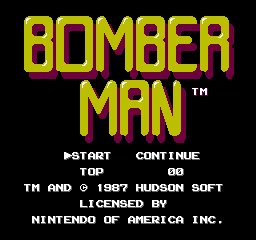
Arguably one of Nintendo’s greatest strengths has always been the ability of their publishers to create compelling characters that stand the test of time. Character concepts that stick with people by not trying to capitalize on “edgy” concepts the way that a lot of products of the 80’s and early 90’s did, but rather giving us silly, lovable figures that we can enjoy without added baggage. We love Mario because his defining characteristics are saving princesses and jumping on turtles. We love Kirby because his defining characteristics are self-inflation and eating everything in his path. We love Bomberman because he blows things up.
I guess what I’m trying to say is, this game is not good. I mean, really lousy. It is inconsistent, unforgiving and brutal in ways that are consistent with programming issues rather than deliberate efforts to make a hard game. Its controls are sticky and touchy at the same time, and the positioning of bombs can be genuinely bewildering. There is nostalgic value to the game, of course, but it’s not something I would invest a lot of time and effort into playing.
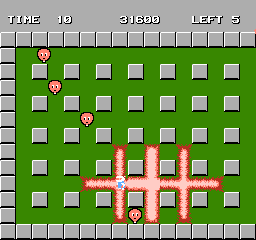
John’s Rating: 2.0 out of 5.0. Playing this game is often a comedy of errors due not only to the scarcity of power-ups, but also to the dull playing fields, touchy bomb placement and ugly graphics. Fortunately, like a surprisingly large number of dull games with redeeming mechanics, it inspired many fruitful, glorious sequels, all equally filled with that awkward moment where you bomb yourself into a wall.
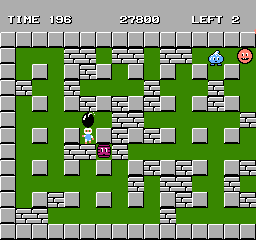
Athletic World
Publisher: Bandai
Year: 1987
Genre: Power Pad
Do you own a Power Pad? The answer to that is, “No, you do not own a power pad because no one does.” The Power Pad was part of an insidious plot to convince us to use video games as a way of staying fit and healthy. How stupid is that? So stupid that DDR made huge amounts of money off the idea. So stupid that all three major game systems of the 21st century are courting that same fitness nut “gamer” crowd through motion sensing cameras and motion capture controllers. So stupid that Pokémon Go is the most popular mobile game of all time. It’s all part of conspiracy to make gamers use games as exercise, and it finds all its roots here.
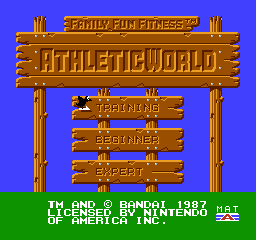
Without a Power Pad, this game is a dull button masher. WITH a power pad, this game is a dull excuse to not go outside because you can get all the energy you need staring at a TV.
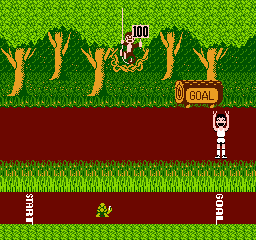
John’s Rating: 0.0 out of 5.0, because I don’t have a power pad, and I’m not going to get one, and you can’t convince me that I’m making a poor life decision.